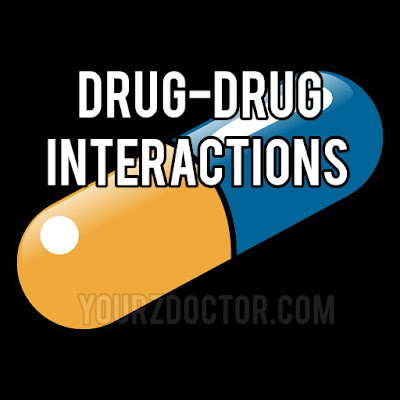Drug-Drug interactions
Some common drug-drug interactions / some important
drug-drug interactions:
When we give warfarin with paracetamol or aspirin
Ø Warfarin + paracetamol / aspirin
Drug-Drug Interactions When
someone is taking warfarin with paracetamol (acetaminophen) this increases the
risk of bleeding because paracetamol has its own antiplatelet effect, so co
administration may lead to hemorrhage.
If we are using upto 2g / day paracetamol is co administered
with warfarin for 7 days the action of warfarin enhances leading to increased
risk of bleeding. Study also show that even at low therapeutic dose of
paracetamol interact with warfarin.
It was resulted from a research that 30% of patients who
were taking warfarin with paracetamol has INR value greater than 6 which is
very high value above reference value (2.5 – 3.5) . This means that patient
were at greater risk of developing hemorrhage.
Similar case is with aspirin when we give warfarin with
aspirin but aspirin should not be more than 100 mg / d . This will increase the
bleeding.
Management of drug-drug interaction/ special care:
Should be avoided or should be taken with low doses or regularly
check the INR or care should be taken to those patients who are at greater risk.
Special care should be taken for the following patients who
are taking warfarin + paracetamol
Ø
NSAID gastrotropathy
Ø
Smokers
Ø
More than 65 years age
Ø
PUD (peptic ulcer disease)
This undesirable action can be minimized by switching to
celecoxib.
Ø When we give ceftriaxone with ringer lactate ( R/L )
Ceftriaxone + R/L
When given together it cause chelation (complex) and cause
major cardio pulmonary effect
Management of drug-drug interaction:
There should be 48 hours gap between these drugs.
Ø
When we give statins with
warfarin Statins + warfarin
When we give statins particularly
atorvastatin, lovastatin with warfarin which is highly protein binding 95% and 5%
is free. Statins displaces warfarin from protein binding , increases free serum
warfarin concentration leading to hemorrhage.
Statins will displace warfarin
100% from plasma protein binding leading to free warfarin concentration in
serum. Free drug is pharmacologically active , warfarin is now 100% and leads
to haemorrhage.
Ø When we give statins with gemfibrozil / niacin / fenofibrate
Warfarin + gemfibrozil / niacin / fenofibrate
When we give warfarin with
gemfibrozil , niacin or fenofibrate , gemfibrozil is lipid modifying agent .
Statins are intended to lower LDL-C . In some cases the target LDL-C not
achieved for which other cholesterol lowering drugs such as niacin or fibrates
may be added with statins.
These drugs can cause
fibromyalgia, muscular dystrophy , rhabdomyolysis which is characterized by
severe muscular pain all over the body and the creatine kinase (CK) level is
increased. Creatine kinase is a muscular damage biomarker which is released
from the muscles when it breaks.
Grape fruit juice with statin also increases the risk of
muscular dystrophy.
Management of drug-drug interaction:
If we are prescribing statins we have to evaluate creatine
kinase (CK) after 14 days again evaluate CK value . If value is increased means
muscle is damaged.
This damage is also concerned by statins isolated. Risk is
increases with niacin and gemfibrozil.
Read
More about this post
Searching Tags
Drug-Drug interactions
Some common drug-drug interactions
Some important drug-drug interactions
Drug-drug interaction When we give warfarin with paracetamol
Drug-drug interaction When we give warfarin with
aspirin
Management of drug-drug interaction
Special care for drug-drug interactions
Drug-Drug interactions
Some common drug-drug interactions
Some important drug-drug interactions
Special care should be taken for the following patients who
are taking warfarin with paracetamol
Drug-drug interaction When we give ceftriaxone with
ringer lactate ( R/L )
Drug-drug interaction when we give statins with
warfarin
Drug-drug interaction when we give statins with gemfibrozil
/ niacin / fenofibrate Drug-Drug interactions
Some common drug-drug interactions
Some important drug-drug interactions






0 Comments